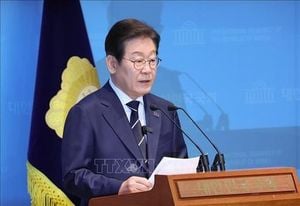During a heated segment on Fox News, White House Deputy Chief of Staff Stephen Miller unleashed a barrage of insults against MSNBC legal analyst Andrew Weissmann. The confrontation, which took place on March 17, 2025, stemmed from Weissmann's criticism of President Donald Trump’s application of the Alien Enemies Act of 1798 for the deportation of Venezuelan gang members.
On March 16, Weissmann had appeared on MSNBC’s The Beat with Michael Steele, where he argued against Trump’s strategy, asserting, "There is no invasion going on." He questioned the legality of using such outdated wartime legislation to justify the deportation of members of the Venezuelan prison gang Tren de Aragua, contending, "You also have to show the people you’re removing are actually part of the gang." The legal basis for Trump's action was swiftly challenged, leading to US District Court Judge James Boasberg pausing the deportation order after scrutiny by the American Civil Liberties Union (ACLU).
Back on Fox News, Miller did not hold back, labeling Weissmann as "an absolute moron," and declaring he should "never be on TV anywhere." He accused Weissmann of having devoted his career to incarcerate innocent Americans and participating in what Miller termed the "Mueller coup" against Trump. Miller’s passionate tirade didn't stop there; he slammed Weissmann as "a fool and degenerate," asserting Weissmann’s presence on television is shameful due to his alleged defense of criminals. "He’s up there shilling for people who rape and murder Americans. That’s who Andrew Weissmann is," Miller exclaimed, expressing disdain for Weissmann’s criticisms.
This confrontation highlights the intensifying rhetoric surrounding not only Trump’s presidency but also the broader discourse pertaining to immigration law and executive power. The Alien Enemies Act, historically meant for wartime, has become contentious terrain amid increasingly polarizing political climates.
Judge Boasberg’s ruling to halt the deportation of hundreds of alleged members of the Tren de Aragua gang reflects the judiciary's role as a check on executive power, illustrating the tensions between legal interpretation and political maneuvering. Weissmann’s commentary emphasizes his legal framework for analyzing Trump's immigration strategy as unconstitutional amid claims of wartime justification.
Miller reaffirmed his commitment to Trump's approach, stating, "I will defend American lives working for President Trump, and Andrew Weissmann can defend illegal alien rapists, terrorists, and predators!" His emotional declarations seem to resonate with Trump's base, who often view immigration policy through the lens of national security.
A stark juxtaposition emerges: Miller's fervent defense of Trump alongside Weissmann's legal critique sparks discussions about the balance between upholding national security and ensuring civil liberties. Weissmann's assertions invite reflection on the ethical responsibilities held by those who craft and enforce immigration policy.
The exchange between Miller and Weissmann, characterized by heat and contention, raises questions about the future of political commentary within the media. The convergence of political agendas and media platforms continues to shape the national conversation, often leading to divisive narratives.
Public reception of such confrontations often appears split among party lines. Supporters of Trump laud Miller's fierce defense of security measures, whereas critics view Weissmann’s perspective as necessary to safeguard democratic principles and human rights.
Despite the broader legal ramifications of these exchanges, it’s evident they serve as fodder for the ever-contentious political stage. The dialogue between Miller and Weissmann symbolizes not only personal animosities but also larger ideological battles within American politics, illustrating how the stakes are elevated as legal challenges proceed against executive actions.
Going forward, how the narratives surrounding Trump’s immigration policies evolve may reflect broader public sentiment as well as judicial interpretations. The clash of voices between political operatives like Miller and legal experts like Weissmann will undoubtedly continue to influence policy discussions, encapsulating the dynamic tensions within contemporary American democracy.
Overall, this encounter is just one of many reflective of the heightened polarization within the current political climate. The divergence of opinions showcases the stakes involved as the nation grapples with defining its values against the backdrop of governance and individual rights.




